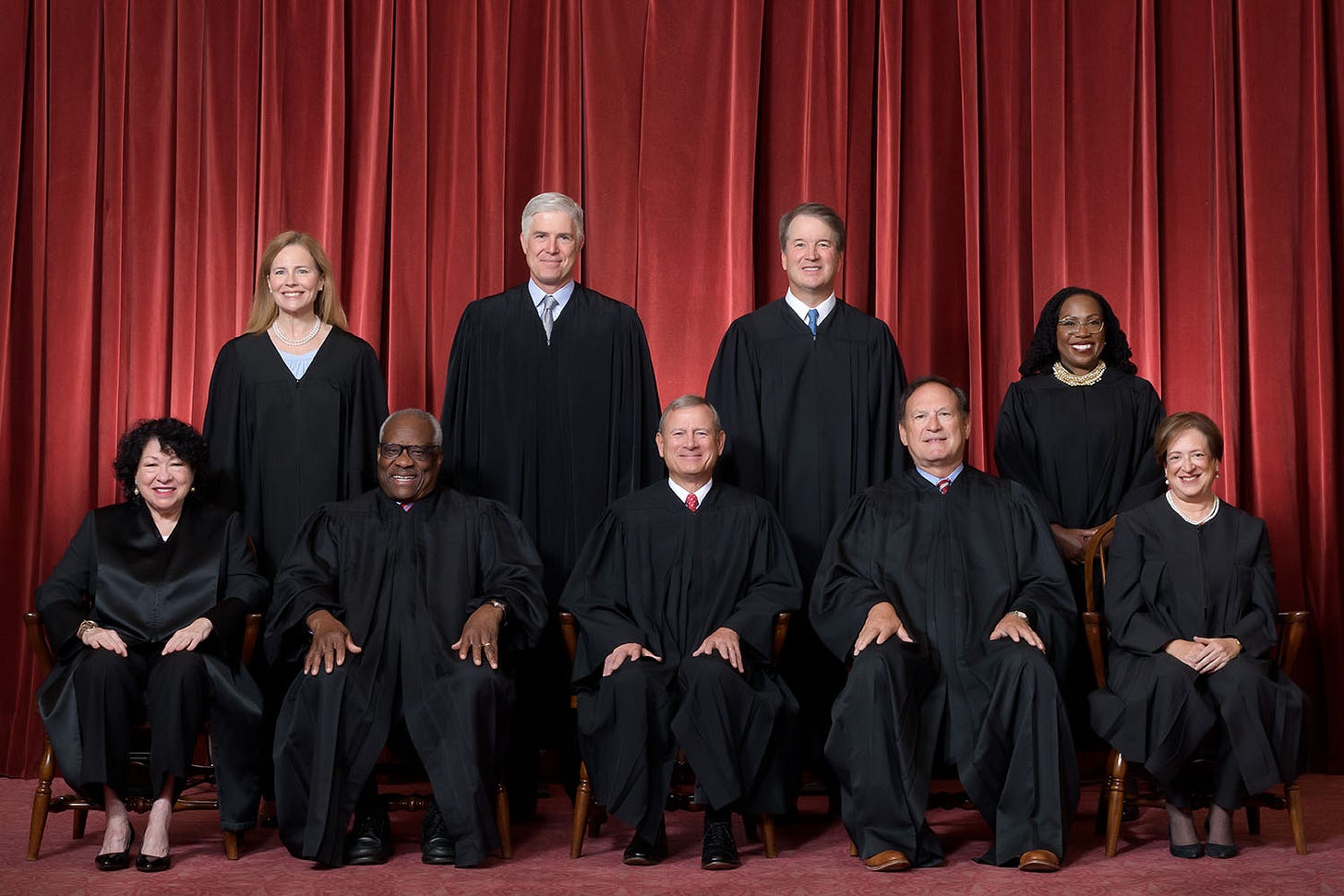The hidden divisions within the Supreme Court
Today’s trans rights case could put them on display.
If you ask anyone what the current ideological division of the Supreme Court is, they’ll probably answer “6-3”: six conservatives, three liberals.
For the most part, they’d be right. Six of the sitting justices were appointed by Republican presidents (three by Trump, two by Bush II, one by Bush I); three were appointed by Democrats (two by Obama, one by Biden). And many of the court’s most recent high-profile cases — on abortion, presidential immunity, regulations, guns, the environment, and student loans — have ended in that same lineup, with the six conservatives together in the majority and the three liberals in the minority.
And yet, viewing the justices as split into two inflexible blocs masks some of the most interesting divisions bubbling up within the court — which could be on display in a hot-button case on transgender rights set to be argued today.
Let me explain.
First off, it should be noted that most of the divisions I’ll explore below are within the conservative wing of the court. Like on Capitol Hill, there is often more unity to be found within the minority — it’s easier to all agree when playing defense than when playing offense. In the 2023 term, according to data from the scholar Dean Jens, liberal Justices Ketanji Brown Jackson, Elena Kagan, and Sonia Sotomayor each ruled with the others at least 89% of the time.
But levels of agreement within the conservative bloc were noticeably lower. Brett Kavanaugh agreed more frequently with Jackson (80% of the time) than with Clarence Thomas (73%). Amy Coney Barrett agreed with Kagan as frequently as she did with Samuel Alito (79% each).
What gives?
Sure, the conservative bloc is larger, and therefore naturally harder to keep united. But those six justices also have subtle nuances in how they decide cases.
Justices Alito and Thomas are the most reliable votes for the conservative position in any given case. Personally, they are the most embattled justices (both have faced questions about their relationships with billionaires); they are also the most committed to “originalism,” a school of thought which calls for laws to be interpreted according to the original public meaning at the time they were written.
Justice Kavanaugh and Chief Justice John Roberts are the most ardent institutionalists among the conservative justices, voting with the liberals in recent terms to block the Independent State Legislature Theory, uphold Section 2 of the Voting Rights Act, and greenlight a vaccine mandate for health care workers.
Justice Barrett has emerged as a frequent critic of the court’s recent turn (most associated with the originalist Thomas) towards deciding cases by considering the “history and tradition” of how the U.S. has traditionally handled a certain matter. Barrett sharply criticized that approach in a trademark case last term; she has also broken with conservatives by siding with the EPA in a case about pollution and siding with the DOJ in a case about prosecuting January 6th rioters.
That leaves one justice we haven’t covered: Neil Gorsuch, Trump’s first appointee to the bench.
When Supreme Court step away from the 6-3 breakdown, they normally gravitate towards a 3-3-3 model of the court: the arch-liberals (Jackson, Kagan, Sotomayor), the arch-conservatives (Alito, Gorsuch, and Thomas), and the three in between (Barrett, Kavanaugh, and Roberts).
Here’s how legal analyst Sarah Isgur Flores plotted them in a Politico piece in June, using data from Jens:
The outlier here is Gorsuch, whose level of agreement with Thomas — they rule together 77% of the time — is the lowest for any pair that sits in the same three-justice “bloc.” (No other intra-bloc pair on the court rules together less than 85% of the time. Most of the other blocs reach sub-90% levels of agreement.)
Some of Gorsuch’s defections are due to his prickly libertarian streak, as seen in his proclivity to side with Native American tribes and criminal defendants against the government. But there also exists a more fundamental fracture between him and the other court conservatives — and here we arrive at the split that could become relevant in today’s case.
Gorsuch is certainly an originalist like his bloc-mates Alito and Thomas — but, more accurately, he belongs to a closely related (but subtly different) school of legal interpretation known as “textualism.” While originalists attempt to rule in accordance with the ordinary public meaning of a statute when it was written, textualists aim to rule according to the literal text of the statute — without considering what its drafters might have meant at the time.
It’s his strict interpretation of textualism that led Gorsuch to author the court’s 2020 landmark opinion in Bostock v. Clayton County, which ruled that discrimination against gay and transgender employees violated the Civil Rights Act. Many court-watchers were surprised to see Gorsuch leading the charge — but, from a textualist’s perspective, the opinion made perfect sense.
The Civil Rights Act prohibits discrimination on the basis of “race, color, religion, sex, or national origin”; if an employer would fire a man who was married to man, but not a woman who was married to a man, that was sex-based discrimination. “It is impossible,” Gorsuch wrote, “to discriminate against a person for being homosexual or transgender without discriminating against that individual based on sex.”
LGBT rights will now return to the court in United States v. Skrmetti, which will be argued before the justices this morning. The case is a challenge against Tennessee’s 2023 law prohibiting doctors from prescribing puberty blockers or hormone therapies to allow transgender minors to “identify with, or live as, a purported identity inconsistent with the minor’s sex.” (The law also prohibited surgeries aimed at the same purpose, although that ban is not at issue in today’s case.)
The law’s challengers — including the ACLU’s Chase Strangio, who will today become the first transgender lawyer to argue before the Supreme Court — argue that the ban violates the 14th Amendment, which bars states from denying “any person within its jurisdiction the equal protection of the laws.”
The Biden administration is siding with the challengers, and the language in its brief is a clear nod to Gorsuch’s logic:
In operation, as mandated by its text, [the Tennessee law] restricts care only when it would induce physiological effects inconsistent with an individual’s sex assigned at birth. An adolescent assigned female at birth cannot receive puberty blockers or testosterone to live and present as a male, but an adolescent assigned male at birth can. And vice versa, an adolescent assigned male at birth cannot receive puberty blockers or estrogen to live and present as a female, but an adolescent assigned female at birth can.
That is sex discrimination. As this Court has explained [in Bostock], when a law or policy “penalizes a person identified as male at birth for traits or actions that it tolerates in [a person] identified as female at birth,” the person’s “sex plays an unmistakable” role.
There are important differences between Bostock and Skrmetti, including the fact that sex discrimination is more clearly prohibited by the text of the Civil Rights Act (which was at issue in Bostock) than by the 14th Amendment (although a long line of sex discrimination cases have cited the amendment).
Notably, Tennessee’s lawyers also cite Bostock — arguing that it doesn’t hurt their case, but helps it:
Bostock emphasized that to determine whether an act “discriminate[s],” a court must use a comparator—i.e., compare the plaintiff to “others who are similarly situated.” In Bostock, male and female employees were similarly situated because “[a]n individual’s homosexuality or transgender status is not relevant to employment decisions.”
Here, by contrast, using testosterone or estrogen to treat a deficiency and restore naturally occurring levels is in no way similar to using those drugs to elevate hormone levels far above the naturally occurring baseline to induce or prevent certain physical changes.
Which Gorsuch falls on remains to be seen. But it isn’t hard to tell which justice both sides are targeting in their brief — the only one who has authored a landmark opinion upholding transgender rights. (Gorsuch also notably voted with the court’s liberals in August on another sex discrimination case with implications for transgender rights.) If he breaks with his ideological bedfellows again, it will be yet another reminder that the court’s divisions are often more nuanced than they seem.
More news to know
South Korean President Yoon Suk Yeol lifted his short-lived martial law order after lawmakers — fighting back troops — roundly rejected his attempt to centralize power and squash political opposition. Yoon is now facing calls to resign or be impeached.
Pete Hegseth’s nomination to be Defense Secretary appears increasingly imperiled, with at least six Senate Republicans “currently not comfortable” supporting him, per NBC. In addition to a sexual assault allegation, Hegseth has been accused of financially mismanaging the two organizations he previously led — as well as having a worrying relationship with alcohol at those jobs and as a host at Fox News.
President-elect Trump is reportedly considering an unexpected name to replace Hegseth if his nomination sputters: his former rival Ron DeSantis.
Florida sheriff Chad Chronister, Trump’s nominee to lead the Drug Enforcement Administration, became the second Trump pick to withdraw from consideration, just three days after his selection was announced. Chronister had received criticism from conservatives for his 2020 arrest of a pastor who held a church service in violation of Covid-era violating quarantine orders.
Rep. John Duarte (R-CA) has conceded to his Democratic challenger, Adam Gray, which means all 435 House races have been decided. Republicans won 220 seats to Democrats’ 215, a net gain of one seat for Democrats; the margin will drop to 217-215 after Trump appointees (or would-be appointees) resign their seats.
The Trump transition team belatedly signed an agreement with the Justice Department allowing the FBI to conduct routine background checks on the president-elect’s nominees.
Hunter Biden’s gun case has been officially terminated after receiving a pardon from his father. Meanwhile, the judge in his tax case pushed back sharply against President Biden’s claims that his son had been unfairly treated. Court filings confirmed that President Biden bypassed the Justice Department in granting the pardon.
Trump’s lawyers cited the Hunter Biden pardon in arguing for his New York hush money case to be dismissed. “President Biden argued that ‘raw politics has infected [his son’s case] and it led to a miscarriage of justice,’” Trump’s lawyers wrote. “These comments amounted to an extraordinary condemnation of President Biden’s own DOJ.” Trump’s sentencing in the case has already been indefinitely postponed.
FBI Director nominee Kash Patel was recently informed by the bureau that Iranian hackers had breached his communications, becoming the latest Trump ally to be targeted by Tehran.
The day ahead
President Biden will travel to Lobito, Angola, to complete his lame-duck Africa tour. He will tour the Lobito Port Terminal, visit the Carrinho Food Processing Factory, and participate in the Lobito Corridor Trans-Africa Summit with leaders from the region before flying back to Washington.
Vice President Harris has nothing on her public schedule.
The Senate will hold confirmation votes on two district judge nominees, including Anthony Brindisi, a former Democratic congressman from New York.
The House will vote on up to 30 pieces of legislation.
The Supreme Court will hear oral arguments in United States v. Skrmetti, the case on whether treatments for transgender minors violate the 14th Amendment.








Awesome article today, Gabe! Keep up the great work!! I love hearing about the real deal just below the surfaces everyone else stops at.
Excellent analysis of an important case ... along with useful insights on voting patterns of members of the Supreme Court. I will be watching Skrmetti closely, as I know many will.